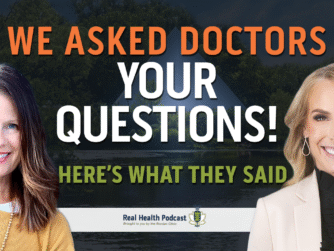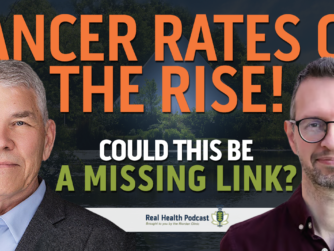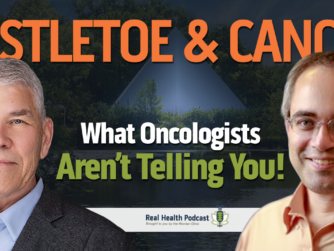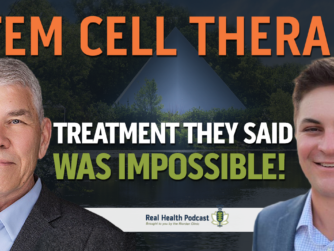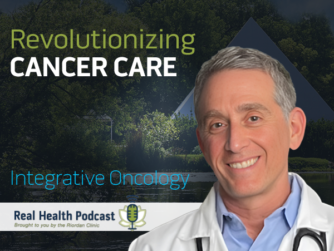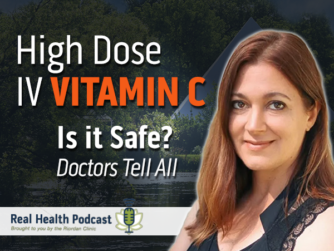In this episode of the Real Health Podcast, Chief Medical Officer Dr. Ron Hunninghake, MD, and Overland Park Medical Director Dr. Lucas Tims, ND, FABNO, discuss lifestyle choices people can make to help prevent a cancer diagnosis.
Watch the Video
Thanks to this Episode’s Sponsor
Links
Dr. Ron Hunninghake: https://riordanclinic.org/staff/ron-hunninghake-md/
Dr. Lucas Tims, ND, FABNO: https://riordanclinic.org/staff/lucas-tims-nd-fabno/
Dr. Lucas Tims Instagram: https://www.instagram.com/doctorlucas/
Riordan Clinic: https://riordanclinic.org/
Read the Transcript
Disclaimer: The information contained on the Real Health Podcast and the resources mentioned are for educational purposes only. They’re not intended as and shall not be understood or construed as medical or health advice. The information contained on this podcast is not a substitute for medical or health advice from a professional who is aware of the facts and circumstances of your individual situation. Information provided by hosts and guests on the Real Health Podcast or the use of any products or services mentioned does not create a practitioner-patient relationship between you and any persons affiliated with this podcast.
Intro: This is the Real Health Podcast brought to you by Riordan Clinic. Our mission is to bring you the latest information and top experts in functional and integrative medicine to help you make informed decisions on your path to real health.
Dr. Ron Hunninghake: Well, welcome, everyone. This is Dr. Ron Hunninghake, and we’re here with another episode of the Riordan Clinic Real Health Podcast, and I’m very happy to welcome as our guest today Dr. Lucas Tims. Dr. Tims, thank you so much for being on again and what are we talking about today?
Dr. Lucas Tims: Thanks, Dr. Ron. Today, I believe we’re going to be diving into all things cancer prevention.
Dr. Ron Hunninghake: A-ha. Aren’t the statistics staggering? Like one in two or one in 2.2 people will get cancer in their lives. That’s talking to most of our audience.
Dr. Lucas Tims: That’s talking to all of them, or if not them, their loved one.
Dr. Ron Hunninghake: Yeah. If things keep getting worse, I mean, that statistic’s going to get worse unless people start thinking about what they can do in their own lives to prevent this disease. This cancer disease strikes terror in people’s hearts, but what can we do to help people understand that they can take action to markedly reduce their risk for cancer?
Dr. Lucas Tims: Yeah, I think that’s essentially the message is that we want people to not feel paralyzed by these statistics, but more of a call to action and helping them realize that there are things they can do, and steps they can take, and habits they can build that will reduce a lot of that risk. But where we’re seeing, I think, the major shift is, for years and years, I think we’ve all kind of accepted the basics of cancer prevention, keep a healthy weight, don’t smoke, limit alcohol, try to exercise most days, eat a diverse amount of fruits and vegetables. Those are kind of the basics now.
I think that we’ve gotten to the point of needing additional layers of awareness and prevention to deal with all the other ways in which we’re getting exposed to things that drive cancer in our body. That’s where I think we’re needing to further the conversation is, yeah, it’s like, okay, we need everybody doing the basics, which we still don’t have people doing the basics, which that’s important, but you and I are seeing people that are coming to us that have done the basics and they’re still getting cancer.
Dr. Ron Hunninghake: That’s the scary thing is I have a lot of patients say like, well, they’ll come with breast cancer and say, “I don’t get it. I don’t have a family history. I’ve been careful about what I eat. I don’t smoke. I don’t do these things that we normally associate, and yet I still got the cancer.” Now, that’s where we can get into some nuances, and I just want to introduce the word that everyone knows very well, and that’s stress. Stress seems to be a risk factor for cancer. Now, it comes in a lot of different nuances, just not sleeping very well, maybe that’s a consequence of stress. There’s very clear research now that sleep deprivation or people who work shifts, shift work, people are talking about that as a carcinogen.
Dr. Lucas Tims: Yes, yes. It’s not necessarily always things that we’re putting in our body. It’s sometimes things that our body is not getting.
Dr. Ron Hunninghake: Yeah.
Dr. Lucas Tims: It’s the lack of things. It’s the lack of good balance, circadian rhythm, sleep cycles. It’s not just how much you sleep, it’s when you sleep. It’s the quality of the sleep. Some people think they sleep great all night, but as we’ve been able to do more sleep science and study into the vast arena that is sleep and how that affects our body, we’ve found that there’s a lot of components to it that matter. Making sure that you don’t have disturbances, whether you’re aware of them or not throughout the night, whether that’s things like sleep apnea or light disturbances or EMFs in the room or things like that. Then matching our sleep cycles to the way that nature intends us to be in terms of the sun and moon, and day and night cycles, we want to match those as much as possible. Things like you said, shift work, and the fact that just our world is always on, 24/7, everything now, it kind of is really causing a problem for a lot of people with their sleep.
Dr. Ron Hunninghake: That sleep apnea, basically, people are starving for oxygen during the night several times, hundreds of times, sometimes, during the night, and it’s low oxygen that actually initiates the cells shifting towards the cancer metabolism, the lack of oxygen, hypoxia. That’s a very clear-cut one. But, again, people don’t realize oftentimes that they’re having sleep apnea, and so they need to be aware of it and think about, “Why am I waking up tired? Why am I waking up with a dry mouth? Why do I keep falling asleep during the day?” Well, go get checked to see whether or not … Because now they have really pretty simple home tests that you can figure that one out.
Dr. Lucas Tims: Yeah, there’s way less pieces to it now, and you can do them at home and you can even get devices now that can give you a pretty good idea of, if you are having interrupted sleep, maybe not make the full diagnosis of sleep apnea, but these wearable devices, rings, and watches, and bands, and stuff, those are sometimes a good place for people to start as well. At the very least, try to at least monitor and understand how you’re sleeping. And those apps and devices, there’s several of them out there and a lot of good ones.
Dr. Ron Hunninghake: Dr. Tims, it really makes me think also about how one thing that’s shifting now is how important it is for us to take back our own self responsibility for thinking about these kinds of things and taking action. Because a lot of times we think of cancer prevention as our go get our colonoscopy. Well, of course that’s a good thing, yes. And don’t smoke. But these nuanced things that we’re bringing up here today, people need to be aware that they carry a big part of the responsibility for making decisions in favor of better health.
A lot of people say, “Well, yeah, I want to be healthier.” Good, what are the little things that you can do … If we shift here where we’re talking about sleep, something that everyone knows is a factor in cancer is diet, and what are some of the things that people can change in their diet that doesn’t necessarily have to be overly dramatic? You don’t have to become a vegetarian, you don’t have to do coffee enemas. What do we need to do as responsible people who want to maintain our health in terms of our diet?
Dr. Lucas Tims: I think the answer there is pretty clear in terms of what are the low-hanging fruit and that’s reduce your intake of junk food. When I say junk food, I think everybody kind of knows what I’m talking about. We’re talking about ultra-processed foods, which are what you get at the fast food joints, in the drive-throughs, even a lot of the sit-down restaurants, I would consider that junk food. Then the stuff that you buy in the middle of the grocery store, all the things in the boxes and the bags and the packages.
If it didn’t come straight from the earth, it’s processed to some extent. Now, there’s some minimally-processed stuff that we’re not too worried about, but the more processed we get, the more carcinogenic, and the more disease-promoting we see those types of foods. Limiting your intake of junk food, sodas, processed foods, processed sugars, processed meats, these are where we see the biggest signals in the data in terms of increasing your risk for many different types of cancer.
Beyond that, I don’t know, I think there’s enough evidence to say that we’re likely overeating as a society. I think getting back to some of our natural practices in terms of fasting is probably … Again, I don’t know, some people wouldn’t consider that a diet approach, but I do, even not eating I think can be a diet approach. We try to get patients doing more therapeutic fasting and there’s lots of different ways to do fasting. I don’t know if we have the time with this podcast to go into all the different types of fasting that’s out there, but some form of fasting, giving your body that break from expending all the energy that’s required to digest food and allowing those resources to be used for a cleanup. I call it a self-clean cycle, kind of like you hit that button on your oven every once in a while to clean it out. That’s essentially what we’re getting a lot of times with those fasting states. So, prolonging those periodically can be helpful.
Then I think trying to incorporate a diverse variety of plant-based foods as well, and focusing on fiber and nutrient-dense foods is probably going to clean up the rest of what most people need to be doing.
Dr. Ron Hunninghake: Yeah, I think it’s taking ownership of the fact that you are the chooser. You are the one that’s going to … Either you or your spouse or your family, you’re going to be making conscious choices in the direction of everything you’ve just said. Even to the point, we are now cooking a lot more at home than we used to, and we feel like, hey, we know what we’re buying, the colorful vegetables, we’re preparing it at lower heats, we’re using the right oils. There’s a lot of bad oils out there. You want to use the monounsaturated fats are really good, more salads and things like that. It’s that ownership of taking better care of myself in the realm of diet and food. This is a big part of it. What about, I think we’ve talked about toxicity, and obviously cigarette smoking is an awful, that’s a self-chosen horrible toxicity, and I realize for some people it’s tough to stop, but it’s worth continuing to focus on that. But what are some of the more subtle toxic, awareness of toxins? How can people become more aware of the toxins in their environment and make changes that way?
Dr. Lucas Tims: This is where I think this is a really tricky one for a lot of people, and I think it requires a ton of educating yourself and also may require making some really hard decisions on your daily habits. Why I say that is because I don’t think most people are aware how many chemicals we’re exposed to on a daily basis between the air we’re breathing, the water we choose to drink, the food that we’re eating, and then all of the personal care products in terms of beauty products, cosmetics, shower items, deodorants, lotions, over-the-counter meds that we’re taking maybe for allergies, stuff like that. These things are all, they’re not just like, those didn’t get plucked out of the earth somewhere. They’re not natural. They all require some sort of usually preservatives or some type of chemical to stabilize those products.
There’s a reason why you can leave a deodorant in your drawer for a few months, and it still looks the same. So, we’re starting to discover that these products are inherently toxic. Then we’re also finding that a lot of these products are further contaminated through the processing of that, and that there’s really a lack of regulation around that. I mean, I think a lot of people just ignorance is bliss and they want to think that these regulatory agencies are looking out for us, and the EPA would never let enough chemicals in these products to really cause harm. That’s not the case. You really have to be an informed consumer, and at the end of the day, you have to take, like you said, ownership for the products that you’re using.
Advertisement: There’s a lot more to this conversation and it’s coming up right after a quick break. Today’s podcast is brought to you by LivOn Labs, makers of liposomal vitamins and supplements. LivOn uses a liposomal encapsulation technology to protect nutrients from destruction in the digestive system. This allows for more efficient delivery of essential vitamins and nutrients. Choose from various supplements that support health and wellbeing such as Lypo-Spheric Vitamin C, magnesium, glutathione, and more. To learn more, visit LivOn Labs, that’s L-I-V-O-Nlabs.com.
Dr. Ron Hunninghake: Just taking the whole concept of estrogen and estrogen-like products. I mean, not only do you find it in actually people taking too much estrogen, even hormone replacement therapy, I’m working more and more with patients who are on that to get the least possible dose that does the job. I’m having those people eat more cruciferous vegetables, more DIM-containing foods to help them better protect themselves from estrogenic compounds. But then there’s plastics and then there’s a lot of the facial creams that you were mentioning that those contain estrogens.
Dr. Lucas Tims: Endocrine-disrupting chemicals.
Dr. Ron Hunninghake: There you go. That’s it.
Dr. Lucas Tims: That’s the term, you’ll see it, the acronym EDCs. These are a whole family of chemicals, like you said, plastics, plasticizers, PFAS, all kinds of things that can disrupt and almost mimic estrogen in the body. We’re not talking about the good estrogen that protects your bones and your heart and makes your hair nice. We’re talking about the carcinogenic forms of estrogen.
Dr. Ron Hunninghake: Yeah. Just being aware along that line.
Dr. Lucas Tims: Yeah.
Dr. Ron Hunninghake: What about, shifting again, I think a lot of people are buying into exercise and moving their body around. I was surprised to find out that exercise may even be more important than food. I mean, of course, they’re all important, but some people rank it a little higher. Why is exercise so important and how does it prevent cancer?
Dr. Lucas Tims: Well, I think there’s a number of known mechanisms and probably even some that we don’t know yet. But I think, at its truest form, our bodies are designed to move. And when it comes to toxicities and things like that, our bodies are designed to filter out a lot of crap. Oftentimes, what we’re doing is we’re not assisting the body’s ability to detoxify and move that stuff, because a lot of our lymphatic system, which is really our waste removal system in the body, that requires muscle contractions and movement and circulation and all that, those things that you get when you exercise. Again, it doesn’t have to be bootcamp-style exercise, but you’ve got to move your body, get your heart rate up a little bit. I think that that helps to clean out a lot of this stuff that can build up and fester. Because like I said, our bodies are designed to deal with a lot of this, it’s just when it becomes too much and we are not doing the regular practices to help it clean itself.
Dr. Ron Hunninghake: Exercise does a couple other things, too. It’s a way of reducing stress. We haven’t really hit stress quite so much, but if you get into a daily exercise program, you’re going to be less stressed, you’re going to burn off some of the stress that you feel, you’re going to oxygenate your bodies better, because you’re breathing deeper. A lot of people-
Dr. Lucas Tims: You’re more likely to utilize glucose in your muscles rather than store it and create more fat in the body as well with exercise.
Dr. Ron Hunninghake: Exercise is just, again, it’s our day-to-day routine. I think when people are saying, “Well, what can I do to prevent cancer?” Well, look at your day. What time do you go to bed? What time do you get up? How do you feel when you get up? Do you drink water when you get up? Are you adequately hydrated? What kind of foods are you going to eat? Are you making a decision to intermittent fast that morning? Every little choice that you’re making throughout the day is really an opportunity to help take better care of yourself, which little by little reduces your risk. Over time, you live longer and you live better. It’s really along the line of what I tell cancer patients, if you make the right decisions to get over your cancer, you’ll be healthier than you’ve ever been. If you make the right decisions to prevent cancer, you’ll be healthier than you’ve ever been. But you just have to make those-
Dr. Lucas Tims: Yeah, I love that.
Dr. Ron Hunninghake: … decisions.
Dr. Lucas Tims: To me, what I think has become more clear is that, as… I think there was a time ago in the past where we didn’t have to think so much and make so many decisions about our health, because of the way that we lived a little more connected and harmonious with nature. A lot of these things were built into our lifestyle. It’s only when we’ve seen the industrial age and all the modern conveniences, where we actually have to do a ton to offset now. And we have to think about it actively as prevention rather than just being, which I think there was a time when, if you just did the things that you need to survive as a human in concert with nature, a lot of that stuff gets built in. But now it’s much more of a, we have to be aware, we have to have certain daily practices that connect us to nature, that get our body back to working the way it’s designed to work and avoiding all the extra clutter that’s out there and all the toxins that are just increasingly multiplying out there in our daily environment.
Dr. Ron Hunninghake: Medical care, by and large, is somewhat passive, where you go to the medical system, the doctor, whoever, and you’re tested, you’re done, too. A woman would get a Pap smear or a mammogram. A male would get a prostate exam or a PSA. This is all things that are passive. It’s not to say that early detection isn’t a good idea. It’s a good idea and don’t forget it. But on the other hand, what we’re talking about here is a greater degree of involvement on the part of each one of us in our own unique cancer prevention program, utilizing these ideas of how we can learn how to take better care of ourselves.
Last but not least, and probably most of our stress, I think we can pretty much agree that stress is a major factor in cancer disease. How are we taking care of each other, our families, our jobs? Are we creating stress for other people, let alone for ourselves? Are we going to make a change in our attitudes towards how we treat our compatriots, our coworkers, our family, not only for the sake of just being a good human being, but because we now know that when you’re really highly stressed and not connected with people, that disconnectedness, that’s a cancer risk, too.
Dr. Lucas Tims: Yeah. Just another one of these ways in which stress hits the body. I think it’s safe to say that human beings, we are social beings, we are meant to be parts of tribes and communities. I think we’re meant to have purpose, we’re meant to be loved and to give love to other people. I think our modern society has also pulled us away from those types of things. The more we dive into technology, I think the more we pull away from true community, even though some people find a lot of community through online platforms and social media, I just don’t feel like that’s really a replacement for being in someone’s physical space. It’s almost like trying to spend time in nature by watching National Geographic on your TV. It’s not the same.
Dr. Ron Hunninghake: Right.
Dr. Lucas Tims: Yeah, I think we need to get back to those things, and that might be at the most basic root of a lot of chronic disease is just how we’re living our lives. We’re getting farther and farther away from the way I think humans are supposed to be living their lives, like I said, in community, with loving relationships, having a sense of purpose, and being fulfilled, and receiving and giving love.
Dr. Ron Hunninghake: Cancer is a disease, but it’s also a metaphor of the fact that we’re losing aspects of what it means to be human. Everything that we’ve talked about on this program are like cancers that are eating away at the quality of our life and the meaningfulness that we can bring to our lives. There’s a spiritual dimension here, a holistic dimension that I think is really important in terms of not only taking better care of yourself, but learning how to take better care of those around you and how to care for our planet, our environment. These all represent cancerous areas that we can make changes for the better and thereby reduce our own personal risk, but also the risk of all earthly travelers.
Dr. Lucas Tims: Well said.
Dr. Ron Hunninghake: Well, I think we’ve gotten pretty philosophical there, but I’ll tell you what, if you aren’t philosophical about this, it’ll overwhelm you with fear. I don’t think fear is the answer to preventing cancer. I think it’s being open and being willing to learn and take charge of these areas. Dr. Tims, thank you so much for these thoughts, and I hope our audience is going to go away with a sense of more control and more hope, that we don’t have to make this statistic worse and worse. Maybe we can be part of a generation where that begins to turn around as we take better care of ourselves and our families and our planet.
Dr. Lucas Tims: Couldn’t agree more. I think this, if anything, it’s just a call to action and a call to awareness. If you’re not doing those basics that we discussed, start there. But if you’re doing the basics, I think there’s need to take a few extra additional steps with some of these other things we’ve discussed today. Just get started. It doesn’t have to be perfect. It doesn’t have to be perfect. It’s just about getting started and taking action. If you don’t know where to start, maybe give us a call.
Dr. Ron Hunninghake: Check out the Riordanclinic.org. We have a lot of really good information on how people can take better care of themselves and take charge of their life and their health. Thank you again, and thank you, everyone, for listening in, and we’ll be back the next time with the Riordan Clinic Real Health Podcast. Thank you.
Outro: Thank you for listening to the Real Health Podcast. If you enjoyed this episode, be sure to subscribe and leave us a review. You can also find all of the episodes and show notes over at realhealthpodcast.org. Also, be sure to visit Riordanclinic.org, where you will find hundreds of videos and articles to help you create your own version of real health.


